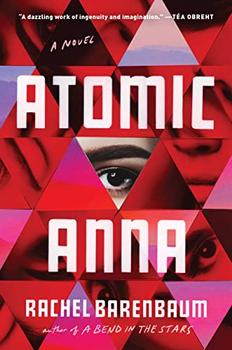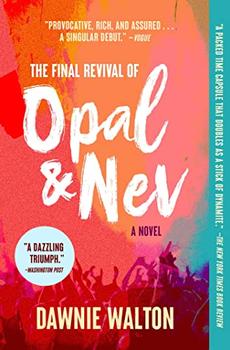Summary | Excerpt | Reviews | Beyond the book | Read-Alikes | Genres & Themes | Author Bio

Trinity by Louise Hall is that rare book that delivers on expectations. It is innovative and intricate, full of detail and depth. The plot is well-structured, thoughtful, and beautifully brought to life. Hall set out to explore the limits of knowing another person, and she has very clearly done what she intended - her characters are both inscrutable and incredibly familiar, they are at once telling you too much and not enough.
The premise is simple - we are looking over the life and times of J. Robert Oppenheimer, the father of the atomic bomb. The goal, at least on the surface, is to better understand who he is. Is he a communist or a Russian spy? A pacifist or a warmonger? Is he kind and remorseful or calculating and smug? Rather than offering conjecture on the man himself, the author narrates his life through seven testimonials from fictional characters and their imagined interactions or relationships with Oppenheimer over the years. There is the secret service agent that spent two nights following Oppenheimer to vet him for security clearance, then a lifetime remembering those nights, perhaps wondering if he might have missed some vital detail that would have indicated the man he was monitoring was a spy. There is the girl who fell in love with Oppenheimer's colleague and watched him from the sidelines as he directed the Manhattan Project. There is a former secretary, a floundering journalist, a hopeful student and, only once, an actual friend. In between each testimony, the author chronicles the events of the bomb's first trial detonation - the Trinity Test. This is the only first-hand glimpse we get of Oppenheimer, his quiet determination and his desire to know more.
What is fascinating about these impressions is that they are so fleeting. Each person, asked to speak of Oppenheimer, speaks instead of him or herself. Oppenheimer is the gilded frame for their story. Yet through these oblique references we learn of the times and settings in which this great and complicated man existed. While we never hear of the aftermath or results of his court hearings, we are given an understanding of the panic and paranoia that took hold of the country during McCarthyism (see Beyond the Book).
Each story is so fully developed, each character so fully realized, it is impossible not to form some level of attachment. All this in short chapters, spanning fifty pages or less! Hall writes beautifully, with great feeling and compassion. The people giving their testimonials are deeply flawed, they make grave mistakes and rarely learn from them, but they are also deeply human. It is difficult to turn away, to denounce them as fools, because we know them. Maybe we are them.
Although Hall guides us into such knowing and understanding, the thrust of the story is that we never really know anyone. We may see glimmers that reflect our own foibles and insecurities and latch on to those, but we can never really, truly know another person. This theme is stressed over and over again. It can be seen in the sharp contrast between the storied Oppenheimer and the one that people actually met. It can be seen in the failed marriages, inexplicable affairs and questions of self-worth that plague each testimonial.
When Oppenheimer is questioned by the United States Atomic Energy Committee in 1954, there seems to be little focus on determining whether he is guilty or innocent of treason. One of the book's testimonies briefly touches on the trial and the main question being asked—"How do you know you can trust this man?" Phrased another way, this question could also be, "Who is J. Robert Oppenheimer?" and the answer is, unfortunately, we will never know. He is not, just as we are not, necessarily the sum of his parts.
Lyrical, sad and absolutely engrossing, Louisa Hall's Trinity is a beautiful work of art, deserving of high praise.
![]() This review was originally published in The BookBrowse Review in November 2018, and has been updated for the
September 2019 edition.
Click here to go to this issue.
This review was originally published in The BookBrowse Review in November 2018, and has been updated for the
September 2019 edition.
Click here to go to this issue.

If you liked Trinity, try these:

by Rachel Barenbaum
Published 2023
From the author of A Bend in the Stars, an epic adventure as three generations of women work together and travel through time to prevent the Chernobyl disaster and right the wrongs of their past.

The Final Revival of Opal & Nev
by Dawnie Walton
Published 2022
A kaleidoscopic fictional oral history of the beloved rock 'n' roll duo who shot to fame in 1970s New York, and the dark, fraught secret that lies at the peak of their stardom.
Your guide toexceptional books
BookBrowse seeks out and recommends the best in contemporary fiction and nonfiction—books that not only engage and entertain but also deepen our understanding of ourselves and the world around us.